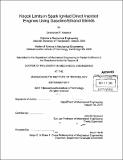Knock limits in spark ignited direct injected engines using gasoline/ethanol blends
Author(s)
Kasseris, Emmanuel P
DownloadFull printable version (12.60Mb)
Other Contributors
Massachusetts Institute of Technology. Dept. of Mechanical Engineering.
Advisor
John B.Heywood.
Terms of use
Metadata
Show full item recordAbstract
Direct Fuel Injection (DI) extends engine knock limits compared to Port Fuel Injection (PFI) by utilizing the in-cylinder charge cooling effect due to fuel evaporation. The use of gasoline/ethanol blends in DI is therefore especially advantageous due to the high heat of vaporization of ethanol. Additionally ethanol blends also display superior chemical resistance to auto-ignition, therefore allowing the further extension of knock limits. An engine with both DI and port fuel injection (PFI) was used to obtain knock onset limits for five gasoline/ethanol blends and different intake air temperatures. Using PFI as a baseline, the amount the intake air needed to be heated in DI to knock at the same conditions as PFI is the effective charge cooling realized and ranges from ~14°C for gasoline to ~49°C for E85. The Livengood-Wu auto-ignition integral in conjunction with the Douad-Eyzat time to auto-ignition correlation was used to predict knock onset. The preexponential factor in the correlation was varied to fit the experimental data. An "Effective Octane Number-ONEFF" is thus obtained for every blend ranging from 97 ONEFF. for gasoline to 115 ONEFF. for E85. ONEFF. captures the chemistry effect on knock and shows that there is little antiknock benefit beyond 30-40% ethanol by volume unless the fuel is used in a DI engine. Using this approach, the anti-knock benefit of charge cooling can also be quantified as an octane number. To achieve that, the ONEFF. calculated for an actual DI operating point including charge cooling effects is compared to the ONEFF. obtained from the auto-ignition integral if the unburned mixture temperature is offset to cancel the charge cooling out. The resulting increase in ONEFF., which can be viewed as an "Evaporative Octane Number" ranges from 5 ONEFF. for gasoline to 18 ONEFF. for E85.
Description
Thesis (Ph. D.)--Massachusetts Institute of Technology, Dept. of Mechanical Engineering, 2011. Cataloged from PDF version of thesis. Includes bibliographical references (p. 130-134).
Date issued
2011Department
Massachusetts Institute of Technology. Department of Mechanical EngineeringPublisher
Massachusetts Institute of Technology
Keywords
Mechanical Engineering.